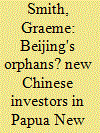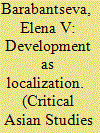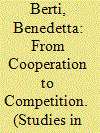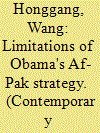|
|
|
Sort Order |
|
|
|
Items / Page
|
|
|
|
|
|
|
| Srl | Item |
| 1 |
ID:
175570


|
|
|
|
|
| Summary/Abstract |
Using a localized perspective, this paper explores the gap between the eligibility criteria for a Beijing hukou (household registration) and the reality of successfully acquiring one. By comparing those who are eligible to apply with those who actually succeed in gaining a hukou, it reveals that hukou practices are operated locally to serve the city's development needs. It also reveals huge gaps between migrants, eligible applicants and hukou winners. Most migrants in Beijing are not eligible to apply for a local hukou. However, among those limited applicants who can apply, those with a postgraduate education and who serve the capital's political functions are more likely than others to win a hukou, an advantage not pointed out in government documents. These “hidden” rules are most likely set intentionally by the city so that it can maintain absolute control over hukou transfers; however, at the same time, they frustrate migrants who meet the stated requirements but who are in reality still unlikely to ever acquire a Beijing hukou. These findings open up a novel perspective for exploring the people–city nexus in China during the migration process and highlight the gaps between policy and reality for those who can apply for a Beijing hukou and those who actually win one.
|
|
|
|
|
|
|
|
|
|
|
|
|
|
|
|
| 2 |
ID:
120198


|
|
|
|
|
| Publication |
2013.
|
| Summary/Abstract |
This paper will explore the perspectives and narratives developed by three different sets of Chinese investors in Papua New Guinea (PNG): investors in the retail, mining, and construction sectors. It is estimated that 90 per cent of new Chinese private investors in the PNG retail sector hail from Fuqing, a coastal community in Fujian province with a long history of transnational migration. Larger state-owned mining ventures and construction companies draw on a more disparate workforce, even though they are headquartered in Beijing. All three sets of investors face different degrees of stigmatization from their competitors, the media, and different Chinese and local actors. Based on interviews with Chinese investors in PNG and China, and drawing on Chinese scholarly studies, this paper will explore the interaction of these three groups of investors with Chinese state and non-state actors, and evaluate how this shapes the process of "localization." The paper will examine how relations with state and non-state actors in PNG are evolving over time, as both groups find ways to "get things done" in a country where mainland Chinese investors have a short history of engagement.
|
|
|
|
|
|
|
|
|
|
|
|
|
|
|
|
| 3 |
ID:
088365


|
|
|
|
|
| Publication |
2009.
|
| Summary/Abstract |
Since China initiated a series of post-socialist transformations in the late 1970s, it has presented itself as a developing country that is pursuing a challenging and ambitious project of socioeconomic construction. It adopted economic development as its primary ideological orientation to complement Marxist thought. China's recent attempts to develop its western region - specifically in the form of the Western Development Project (WDP) - give the ideology of developmentalism a new meaning. This article's close examination of the WDP reveals an interesting interdependence between the issues of development and ethnicity: in addition to addressing problems of unequal regional development, solving increasing security concerns, and tackling poverty, official and scholarly writings in China repeatedly ascribe the WDP with minority features. The author exposes and analyzes the ethnic minority label that China's dominant discourse on development attaches to the WDP and argues that this discourse prevents ethnic minorities from becoming fully recognized participants in the economic transformations taking place in China. It does so by localizing ethnic minorities in one region, China's West, and by characterizing them in a derogatory fashion.
|
|
|
|
|
|
|
|
|
|
|
|
|
|
|
|
| 4 |
ID:
189342


|
|
|
|
|
| Summary/Abstract |
The article explores the complex interaction between war-dynamics and non-state armed groups’ approaches to governance and politics at the local, sub-national level. It focuses on understanding how broader conflict trends influence rebel groups’ choices with respect to establishing local governance partnerships, both with civilian agents and other armed factions. The study examines this question through the lens of the Syrian landscape and through an overview of local governance arrangements by Jabhat al-NusraFootnote1 in the Idlib and Aleppo provinces between 2012 and 2017. In tracing the evolution of rebel co-governance arrangements at the local level,Footnote2 the article highlights two dynamics: first, how the breakdown of centralized governance and the gradual processed of militarization of local authorityFootnote3 altered the balance between civilian and armed actors, shifting power in the hands of the latter. Second, how the combination of prolonged strategic stalemate, resource scarcity and ideological competition between armed factions resulted in a shift from cooperative to competitive rebel governance. The article seeks to further nuance the study of rebel governance and rebel-to-political transitions by focusing on how multi-level relationships affect armed groups’ governance choices.Footnote4
|
|
|
|
|
|
|
|
|
|
|
|
|
|
|
|
| 5 |
ID:
136046


|
|
|
|
|
| Summary/Abstract |
Wireless sensor networks (WSNs) are extensively used in military applications for border area monitoring, battle-field surveillance, tracking enemy troops, where the sensor nodes run on battery power. Localisation of sensor nodes is extremely important to identify the location of event in military applications for further actions. Existing localisation algorithms consume more energy by heavy computation and communication overheads. The objective of the proposed research is to increase the lifetime of the military sensor networks by reducing the power consumption in each sensor node during localisation. For the state-of-the-art, we propose a novel intelligent unmanned aerial vehicle anchor node (IUAN) with an intelligent arc selection (IAS)-based centralised localisation algorithm, which removes computation cost and reduces communication cost at every sensor node. The IUAN collects the signal strength, distance data from sensor nodes and the central control station (CCS) computes the position of sensor nodes using IAS algorithm. Our approach significantly removes computation cost and reduces communication cost at each sensor node during localisation, thereby radically extends the lifetime and localisation coverage of the military sensor networks.
|
|
|
|
|
|
|
|
|
|
|
|
|
|
|
|
| 6 |
ID:
101351


|
|
|
|
|
| Publication |
2010.
|
| Summary/Abstract |
Localized constructions of transnational Islamic kinship or 'brothers abroad' are an integral part of discursive practices within the community of the Islamic Party of Malaysia (PAS). Based on empirical data gained from anthropological fieldwork between 2009 and 2010, this article examines domestic manifestations and the implicit subtexts of the party's foreign policy, with particular regard to the Palestinian cause. Narratives of victimization and heroism are thereby as important as demonizing projections of delinquency and evil, while at times images of local and external enemies melt together. Furthermore, it is shown that PAS's Islamist internationalism is essentially (g)local, whereas national and ummahist identities are referred to only selectively.
|
|
|
|
|
|
|
|
|
|
|
|
|
|
|
|
| 7 |
ID:
091930


|
|
|
|
|
| Publication |
2009.
|
| Summary/Abstract |
The Af-Pak strategy formulated by the Obama administration is characterized by localization, Integration, demilitarization and polygonization. It is a rational strategy, but it has three defects: the first is that strong pressure imposed on Pakistan may make the country more unstable and increase the unrest in surrounding areas; the second is that demilitarization will be unable to produce results or to meet the political need of the Obama administration; the third is that its geopolitical dimension may weaken other countries' cooperation and support. China generally supports the strategy, but still has many misgivings.
|
|
|
|
|
|
|
|
|
|
|
|
|
|
|
|
| 8 |
ID:
085437


|
|
|
|
|
| Publication |
2008.
|
| Summary/Abstract |
Over the last decade, a range of actors have pressed for states and regional organizations to take action against the illicit trade in small arms and light weapons. Some regional bodies have responded with comprehensive plans of action and impressive policy responses; others have done very little. This article examines the `patchy' response of the Association of Southeast Asian Nations (ASEAN). It looks at how ASEAN played a mediating role between global norm entrepreneurs seeking to promote small arms norms in the region and member-states that opposed many of their goals.
|
|
|
|
|
|
|
|
|
|
|
|
|
|
|
|
| 9 |
ID:
169579


|
|
|
|
|
| Summary/Abstract |
The Gulf Cooperation Council (GCC) region is home to about three fourth of Bangladesh’s expatriates. In 2018, labour migration from Bangladesh to the GCC countries fell by about 60 per cent. Although fluctuation is common in overseas employment, this fall in labour migration to the GCC appeared as a concern because it took place at a time when the Gulf countries had started a renewed drive for localization of jobs. In this context, this paper attempts to see the implications of recent drive on localization of jobs by the GCC countries on overseas employment of Bangladesh. The paper argues that although the earlier localization efforts in the GCC region achieved little success and the success of recent localization drive is still uncertain, there is not much room for complacency for labour sending countries either. Growing youth unemployment and uncertain future of oil are mounting pressure on the governments of the GCC countries and hence things might not go as before. It, therefore, seems that although the labour countries like Bangladesh may not worry just now, they should get themselves prepared for change in the GCC labour market in long run, if not in short run.
|
|
|
|
|
|
|
|
|
|
|
|
|
|
|
|
| 10 |
ID:
181841


|
|
|
|
|
| Summary/Abstract |
What drives public discontent about Chinese investment on the ground? This study probes the “ground truth” of public reaction in Zambia by documenting both the public perception and the actual impacts of Chinese investments. We find a “reputation deficit” for Chinese investment: Zambians are significantly less likely to support Chinese investment than investment from other countries. Combining results from an original household survey, interview records, and official statistics, we examine the drivers of this reputation deficit. Chinese firms are no worse at generating employment or adhering to labor and environmental standards than Western corporations operating in Zambia, according to official statistics as well as public opinion. However, Chinese firms possess a lower degree of localization, specifically in managers’ knowledge of local languages and the provision of culturally relevant benefits, and they are less likely to engage with the media. Our study highlights these previously overlooked causes of the reputation deficit.
|
|
|
|
|
|
|
|
|
|
|
|
|
|
|
|
| 11 |
ID:
110190


|
|
|
|
|
| Publication |
2012.
|
| Summary/Abstract |
There is growing interest among scholars and advocates in the way that the nascent norm of the Responsibility to Protect (R2P) is diffusing at the regional level. This article critically explores the spread of R2P in Southeast Asia against the backdrop of recent scholarship on norm localization. It argues that, contrary to some recent analyses, the R2P norm has not been localized in Southeast Asia. Constitutive localization requires the active borrowing of transnational norms by local or regional actors who build congruence with local practices. Although some regional states have used the language of 'sovereignty as responsibility' there are few signs that local actors are driving the reception of the norm in the region, nor have they institutionalized it. Rather, outsider proponents are the primary advocates and the norm lacks a champion or well-connected 'insider' proponent among regional governments or civil society groups. Second, despite an energetic campaign by advocates, emphasizing consensual and capacity-building activities, many governments are still wary of R2P as a potential threat to sovereignty and regime security. As a result, regional states have taken an 'à la carte' approach to R2P, accepting aspects of the R2P agenda that they find least threatening or that support their national interests, while ignoring or quietly resisting those they find challenging. Rather than localization, what we are seeing with respect to R2P in Southeast Asia is a dramatic change in the way outsiders are reframing the norm.
|
|
|
|
|
|
|
|
|
|
|
|
|
|
|
|
| 12 |
ID:
145110


|
|
|
|
|
| Summary/Abstract |
Reactions to the promotion of human rights norms in post-conflict countries often clash with central assumptions of established theoretical approaches to norm diffusion. Socialization scholars expect either resistance when strong veto players are present and when resonance is missing, or extensive adoption of norms when states are vulnerable to transnational advocacy. Others predict decoupling processes when local capacities for implementation are scarce. Research on norm localization, in contrast, foresees the reinterpretation and modification of norms. The concept of localization, however, is often used as a catch-all category. Based on a new three-step model of translation into discourse, law, and implementation, I distinguish different types of translation. This conceptual approach to norm translation gives an interactional account of how certain types of translation emerge and shows the limits of “cures” for missing compliance proposed in existing approaches. The discussion draws on examples of human rights promotion in post-conflict Guatemala.
|
|
|
|
|
|
|
|
|
|
|
|
|
|
|
|
|
|
|
|
|